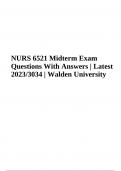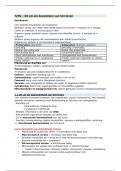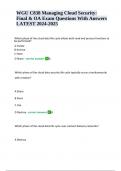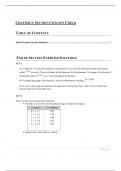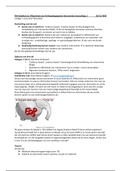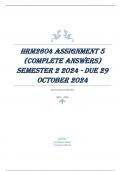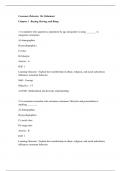WEEK 1 The science of psychology
LECTURE 1
What is psychology? The study of the soul.
Humans are intuitive psychologist (neiging om betekenis te geven aan sociale wereld en inzicht
te krijgen in gedachten van anderen)
Psychological science = the study, through research, of mind, brain and behavior.
→ understanding and predicting: behavior (Actions) and mind (mental activity)
Mind = stuff of thought, mental activity, perceptual experiences (sights, smells, tastes, sounds
and touches), memories, thought and feelings
→ not directly observable
Behavior = what we do (what we can observe, the observable tip of the iceberg)
Heider en simmel animation = psychologisch experiment door Fritz Heider & Marianne
Simmel in 1944.
⇒ hoe mensen van nature de neiging hebben om betekenis toe te geven aan abstracte stimuli
en sociale interpretaties te geven aan niet-menselijke objecten.
- Geometrische vormen die zich bewegen op een scherm.
- Vaak gebruikt bij sociale perceptie en cognitie
Journey through history of psychology
Dualism = separation of the soul/mind and body (theory by descartes)
nature/nurture debate: The arguments concerning whether psychological characteristics are
biologically innate (nature) or acquired through education, experience, and culture (nurture).
! taboe: scheiding lichaam en geest maakte het heilig/mysterieus
Structuralism = ontleden van complexe mentale processen naar eenvoudigere processen,
zonder rekening te houden met functie/doel proces (WILHEM WUNDT)
→ bijv sinaasappel: reduceren tot vorm en kleur.
Gebruikte methodes;
Reactietijden: zoals bij de STROOP-task.
(=experiment waarbij deelnemers gevraagd worden om de kleur van woorden te benoemen
terwijl de betekenis van het woord in strijd is met de kleur ⇒ reactietijd analyseren om inzicht te
krijgen in mentale processen)
Introspectie: mensen gevraagd om hun mentale ervaringen, de volgorde van gedachten, enz te
beschrijven (niet meer veel gebruikt; beperk, en moeilijk objectief te krijgen).
Functionalism = concerned with the adaptive purpose/function of mind and behavior. Mind is
more complex than its elements. Kijkt naar hoe elementen samenwerken en zo van functie
kunnen zijn. (WILLEM JAMES)
Evolution = focus on the way our behavior helps us to survive and reproduce (DARWIN).
→ origin of species = evolutie door natuurlijke selectie
Genetic diversity = er zijn verschillen van genen binnen een soort (sexual reproduction draagt
bij aan genetische diversiteit)
,‘Mutation = variation’ ⇒ veranderingen in de genen kunnen leiden tot variatie binnen een
populatie.
Environmental pressure = evolution has no foresight.
→ organismen passen zich aan aan hun huidige omgeving.
Sexual selection = bepaalde eigenschappen (zang bij vogels, staart bij pauw) dragen bij aan
het succes van een individu bij het vinden van een partner en het voorbrengen van
nakomelingen.
Psychoanalytical approach
⇒ mental processes operate below the level of conscious awareness
- unconscious drives: trauma, culture, childhood expierence
Psychoanalysis (Freud) = kijken hoe onze gedachten verbonden zijn met dingen die we
meemaken (influence outside of psychology)
⇒ Drie niveaus van bewustzijn: bewuste (alles waar we van bewust zijn), het onderbewuste
(gedachten niet op bewuste niveau, maar wel toegankelijk) en het onbewuste (diep verborgen
en bevat verdrongen herinneringen en driften waar we ons niet bewust van zijn).
⇒ Persoonlijkheid uit drie delen: het id (instinctive, impulsieve deel, wil alleen plezier), het ego
(bemiddelt tussen verlangens van het id en de realiteit) en het superego (morele geweten,
gevormd door sociale normen en waarden).
Behaviorism = only observable behavior can be subject of scientific investigation.
→ psychology’s focus should be on how environments affects observable behavior.
⇒ building on work of Pavlov (klassieke conditionering)
Watson = zelfs ingewikkeld gedrag kon worden begrepen/voorspeld door naar omgeving te
kijken
Skinner = bedacht operante conditionering, ontdekte dat beloningen een grote rol spelen bij het
vormen van hoe mensen zich gedragen.
Gestalt = hoe onze hersenen visuele informatie groeperen tot samenhangend beeld. Bijv, als
we stippen op een rij zien, maken we ook een lijn.
→ het geheel is meer dan de som der delen (compleet beeld heeft meer impact, dan alle losse
delen)
Humanistic Psychology = an approach focussing on the basic goodness in people, achieving
goals, and strengths (positive psychology)
→ about humans values, creativity, quality of relationships, gratitude, faith
Cognitive psychology = richt zich op het begrijpen van mentale processen, zoals
denken/herinneren en beslissingen nemen.
→ beïnvloed door vooruitgang in de informatica, hersenen vergelijkbaar met een soort ‘mentale
computer’ (geest als verwerkingssysteem dat info opvangt, opslaat, verwerkt, gebruikt)
The scientific method important because;
- Common sense is often not common or does it make
sense
- Our intuitions and even perceptions are biased
- Critical thinking and psychology
,Optimism bias = we tend to think we are better than others and overestimate our abilities
Dunning-Kruger-effect = mensen met beperkte kennis/vaardigheden op een bepaald gebied de
neiging hebben om hun eigen bekwaamheid te overschatten.
→ denken dat ze veel beter zijn dan dat ze zijn
→ laagpresterenden op cognitieve taken, overschatten eigen prestaties, en andersom
→ beperkte kennis; niet in staat om eigen tekortkomingen te herkennen.
→ zeer bekwaam; bewust van wat er nog te leren valt: onderschatten zichzelf
Availability heuristic = if something is easier to bring to mind / if we hear about something
more often → we judge is as more probable (Tversy & Kahneman)
Confirmation bias = vooral te letten op informatie die eigen mening bevestigd.
The birthday paradox = it only takes 23 people in a room for there to be a 50% chance that 2
of them share the same birthday. People have difficulties believing this:
+ difficulty with exponential growth, + rare events given importance (verjaardag als zeldzaam te
beschrijven), + self-identity (Eigen verjaardag speciaal)
Evolutionary misconceptions
Deterministic fallacy = foutieve overtuiging dat alle aspecten van gedrag of eigenschappen
volledig worden bepaald door genetische factoren en niet door omgeving.
Naturalistic fallacy = foute overtuiging dat als iets natuurlijk is, het ook goed of wenselijk is.
Het idee dat als iets uit de natuur komt het ook goed of wenselijk is.
Fallacy of optimal design = neiging om aan te nemen dat biologische systemen perfect zijn
ontworpen voor hun functie. Stelt dat evolutionaire processen altijd leiden tot meest efficiënte en
perfecte structuren.
Video availability heuristic
Hoe meer voorbeelden we kunnen bedenken, hoe meer het voorkomt.
We herinneren sommige dingen veel meer dan anderen.
How to consume psychological science?
⇒ with amiable scepticism: where is that information coming from?
CHAPTER 1 The science of psychology
Brain = refers to the mental activities that result from biochemical processes within the brain.
Amiable skeptic = remains open to new ideas but is wary of new ‘scientific findings’ when good
evidence and sound reasoning do neet seem to support them (critical thinking)
Ignoring evidence (confirmation bias): the tendency to process information by looking for, or
interpreting, information that is consistent with one's existing beliefs.
→ When they hear about a study that contradicts those beliefs, they look for flaws.
Seeing causal relationships that do not exist: Misperception that two events that happen at
the same time must somehow be related. Our desire to find predictability.
Accepting after-the-fact explanations (hindsight bias): The tendency to look back at an
event that we could not predict at the time and think the outcome was easily predictable.
, Taking mental shortcuts: Mental shortcut that relies on immediate examples that come to a
given person's mind when evaluating a specific topic, concept, method, or decision.
Waarom zijn mensen niet op de hoogte van hun eigen zwakheden?
People are motivated to feel good about themselves and this motivation affects how they
interpret information. ⇒ Because of this, people are resistant to recognizing their weaknesses.
Hypothesis generation is a pre-decisional process by which we formulate explanations and
beliefs regarding the occurrences we observe in our environment.
→ niet weten wat hun zwakheden zijn of dat ze nooit eerlijke feedback hebben gekregen.
The Dunner-Kruger effect = occurs when a person's lack of knowledge and skills in a certain
area cause them to overestimate their own competence.
Three major advances that have helped further the scientific understanding of psychological
phenomena
Brain Imaging: This technology allows us to identify specific brain regions responsible for
various functions, revealing how different areas collaborate for complex behaviors and mental
processes.
Genetics and Epigenetics: Studying the human genome helps us understand how individual
genes influence thoughts, actions, feelings, and disorders. Epigenetics explores how
environmental factors can influence our minds and behaviors.
Immunology and Peripheral Systems: The immune system, along with other systems
regulating stress, digestion, and energy metabolism, is intricately connected to brain function,
structure, and development. This underscores the complex interplay between our minds and
seemingly independent bodily systems. Biological data provides unique insights into
understanding human psychology
LECTURE 1
What is psychology? The study of the soul.
Humans are intuitive psychologist (neiging om betekenis te geven aan sociale wereld en inzicht
te krijgen in gedachten van anderen)
Psychological science = the study, through research, of mind, brain and behavior.
→ understanding and predicting: behavior (Actions) and mind (mental activity)
Mind = stuff of thought, mental activity, perceptual experiences (sights, smells, tastes, sounds
and touches), memories, thought and feelings
→ not directly observable
Behavior = what we do (what we can observe, the observable tip of the iceberg)
Heider en simmel animation = psychologisch experiment door Fritz Heider & Marianne
Simmel in 1944.
⇒ hoe mensen van nature de neiging hebben om betekenis toe te geven aan abstracte stimuli
en sociale interpretaties te geven aan niet-menselijke objecten.
- Geometrische vormen die zich bewegen op een scherm.
- Vaak gebruikt bij sociale perceptie en cognitie
Journey through history of psychology
Dualism = separation of the soul/mind and body (theory by descartes)
nature/nurture debate: The arguments concerning whether psychological characteristics are
biologically innate (nature) or acquired through education, experience, and culture (nurture).
! taboe: scheiding lichaam en geest maakte het heilig/mysterieus
Structuralism = ontleden van complexe mentale processen naar eenvoudigere processen,
zonder rekening te houden met functie/doel proces (WILHEM WUNDT)
→ bijv sinaasappel: reduceren tot vorm en kleur.
Gebruikte methodes;
Reactietijden: zoals bij de STROOP-task.
(=experiment waarbij deelnemers gevraagd worden om de kleur van woorden te benoemen
terwijl de betekenis van het woord in strijd is met de kleur ⇒ reactietijd analyseren om inzicht te
krijgen in mentale processen)
Introspectie: mensen gevraagd om hun mentale ervaringen, de volgorde van gedachten, enz te
beschrijven (niet meer veel gebruikt; beperk, en moeilijk objectief te krijgen).
Functionalism = concerned with the adaptive purpose/function of mind and behavior. Mind is
more complex than its elements. Kijkt naar hoe elementen samenwerken en zo van functie
kunnen zijn. (WILLEM JAMES)
Evolution = focus on the way our behavior helps us to survive and reproduce (DARWIN).
→ origin of species = evolutie door natuurlijke selectie
Genetic diversity = er zijn verschillen van genen binnen een soort (sexual reproduction draagt
bij aan genetische diversiteit)
,‘Mutation = variation’ ⇒ veranderingen in de genen kunnen leiden tot variatie binnen een
populatie.
Environmental pressure = evolution has no foresight.
→ organismen passen zich aan aan hun huidige omgeving.
Sexual selection = bepaalde eigenschappen (zang bij vogels, staart bij pauw) dragen bij aan
het succes van een individu bij het vinden van een partner en het voorbrengen van
nakomelingen.
Psychoanalytical approach
⇒ mental processes operate below the level of conscious awareness
- unconscious drives: trauma, culture, childhood expierence
Psychoanalysis (Freud) = kijken hoe onze gedachten verbonden zijn met dingen die we
meemaken (influence outside of psychology)
⇒ Drie niveaus van bewustzijn: bewuste (alles waar we van bewust zijn), het onderbewuste
(gedachten niet op bewuste niveau, maar wel toegankelijk) en het onbewuste (diep verborgen
en bevat verdrongen herinneringen en driften waar we ons niet bewust van zijn).
⇒ Persoonlijkheid uit drie delen: het id (instinctive, impulsieve deel, wil alleen plezier), het ego
(bemiddelt tussen verlangens van het id en de realiteit) en het superego (morele geweten,
gevormd door sociale normen en waarden).
Behaviorism = only observable behavior can be subject of scientific investigation.
→ psychology’s focus should be on how environments affects observable behavior.
⇒ building on work of Pavlov (klassieke conditionering)
Watson = zelfs ingewikkeld gedrag kon worden begrepen/voorspeld door naar omgeving te
kijken
Skinner = bedacht operante conditionering, ontdekte dat beloningen een grote rol spelen bij het
vormen van hoe mensen zich gedragen.
Gestalt = hoe onze hersenen visuele informatie groeperen tot samenhangend beeld. Bijv, als
we stippen op een rij zien, maken we ook een lijn.
→ het geheel is meer dan de som der delen (compleet beeld heeft meer impact, dan alle losse
delen)
Humanistic Psychology = an approach focussing on the basic goodness in people, achieving
goals, and strengths (positive psychology)
→ about humans values, creativity, quality of relationships, gratitude, faith
Cognitive psychology = richt zich op het begrijpen van mentale processen, zoals
denken/herinneren en beslissingen nemen.
→ beïnvloed door vooruitgang in de informatica, hersenen vergelijkbaar met een soort ‘mentale
computer’ (geest als verwerkingssysteem dat info opvangt, opslaat, verwerkt, gebruikt)
The scientific method important because;
- Common sense is often not common or does it make
sense
- Our intuitions and even perceptions are biased
- Critical thinking and psychology
,Optimism bias = we tend to think we are better than others and overestimate our abilities
Dunning-Kruger-effect = mensen met beperkte kennis/vaardigheden op een bepaald gebied de
neiging hebben om hun eigen bekwaamheid te overschatten.
→ denken dat ze veel beter zijn dan dat ze zijn
→ laagpresterenden op cognitieve taken, overschatten eigen prestaties, en andersom
→ beperkte kennis; niet in staat om eigen tekortkomingen te herkennen.
→ zeer bekwaam; bewust van wat er nog te leren valt: onderschatten zichzelf
Availability heuristic = if something is easier to bring to mind / if we hear about something
more often → we judge is as more probable (Tversy & Kahneman)
Confirmation bias = vooral te letten op informatie die eigen mening bevestigd.
The birthday paradox = it only takes 23 people in a room for there to be a 50% chance that 2
of them share the same birthday. People have difficulties believing this:
+ difficulty with exponential growth, + rare events given importance (verjaardag als zeldzaam te
beschrijven), + self-identity (Eigen verjaardag speciaal)
Evolutionary misconceptions
Deterministic fallacy = foutieve overtuiging dat alle aspecten van gedrag of eigenschappen
volledig worden bepaald door genetische factoren en niet door omgeving.
Naturalistic fallacy = foute overtuiging dat als iets natuurlijk is, het ook goed of wenselijk is.
Het idee dat als iets uit de natuur komt het ook goed of wenselijk is.
Fallacy of optimal design = neiging om aan te nemen dat biologische systemen perfect zijn
ontworpen voor hun functie. Stelt dat evolutionaire processen altijd leiden tot meest efficiënte en
perfecte structuren.
Video availability heuristic
Hoe meer voorbeelden we kunnen bedenken, hoe meer het voorkomt.
We herinneren sommige dingen veel meer dan anderen.
How to consume psychological science?
⇒ with amiable scepticism: where is that information coming from?
CHAPTER 1 The science of psychology
Brain = refers to the mental activities that result from biochemical processes within the brain.
Amiable skeptic = remains open to new ideas but is wary of new ‘scientific findings’ when good
evidence and sound reasoning do neet seem to support them (critical thinking)
Ignoring evidence (confirmation bias): the tendency to process information by looking for, or
interpreting, information that is consistent with one's existing beliefs.
→ When they hear about a study that contradicts those beliefs, they look for flaws.
Seeing causal relationships that do not exist: Misperception that two events that happen at
the same time must somehow be related. Our desire to find predictability.
Accepting after-the-fact explanations (hindsight bias): The tendency to look back at an
event that we could not predict at the time and think the outcome was easily predictable.
, Taking mental shortcuts: Mental shortcut that relies on immediate examples that come to a
given person's mind when evaluating a specific topic, concept, method, or decision.
Waarom zijn mensen niet op de hoogte van hun eigen zwakheden?
People are motivated to feel good about themselves and this motivation affects how they
interpret information. ⇒ Because of this, people are resistant to recognizing their weaknesses.
Hypothesis generation is a pre-decisional process by which we formulate explanations and
beliefs regarding the occurrences we observe in our environment.
→ niet weten wat hun zwakheden zijn of dat ze nooit eerlijke feedback hebben gekregen.
The Dunner-Kruger effect = occurs when a person's lack of knowledge and skills in a certain
area cause them to overestimate their own competence.
Three major advances that have helped further the scientific understanding of psychological
phenomena
Brain Imaging: This technology allows us to identify specific brain regions responsible for
various functions, revealing how different areas collaborate for complex behaviors and mental
processes.
Genetics and Epigenetics: Studying the human genome helps us understand how individual
genes influence thoughts, actions, feelings, and disorders. Epigenetics explores how
environmental factors can influence our minds and behaviors.
Immunology and Peripheral Systems: The immune system, along with other systems
regulating stress, digestion, and energy metabolism, is intricately connected to brain function,
structure, and development. This underscores the complex interplay between our minds and
seemingly independent bodily systems. Biological data provides unique insights into
understanding human psychology

